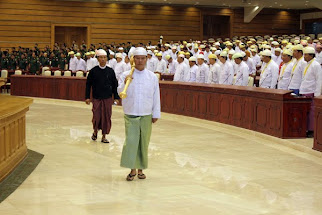Experts fear that a shortage of food, causing mass displacement, is near. Aid agencies have laid out plans to provide emergency food aid
Below is an article published by the Democratic Voice of Burma :
Up to 100,000 people in one of Burma’s poorest regions face starvation after renewed food shortages triggered by a bad harvest, a report due for release this week warns.
Testimonial evidence from nine villages in Chin state suggested they would run out of harvested food supplies by the end of this month at the latest, the UK-based Humanitarian Aid Relief Trust (HART) says. The likely
repercussions include forced migrations of people from four townships – Kanpetlet, Matupi, Mindat and Paletwa – when food stores run out.
“[Many] villagers face two options: either to migrate elsewhere in search of refuge or food, or to seek labour in neighbouring regions and find a way to transport rice back to their families,” said the report.
Villagers have sought help from the World Food Programme (WFP), whose “Work for Food” programme – which requires villagers to build roads in exchange for provisions – has come under fire.
“Such a programme creates massive problems for villagers who now need to be tending to their own agricultural priorities,” warns the report.
A farmers’ representative told HART: “600 people are having to make a road through the jungle with only axes and knives. They are exhausted. If we have to make roads to obtain food aid, please can we have some assistance with road building?”.
Villagers are also “concerned about reports that UNDP will be cutting their [food] support from 10.5 kilograms per capita in 2010 to 7.5 kilograms in 2012.”
WFP told DVB that they are conducting an extensive food security assessment and results will be available by mid February. “In the meantime nutritional initiatives are being launched in the worst affected areas,” said a spokesperson. “Apart from the logistical challenges, WFP and all the organisations involved in the assessment and possible response in the area face an acute lack of funds.”
The current food shortage can be traced back to the 2007 Mawta famine, where an infestation of rats destroyed thousands of acres of crops almost overnight. It took a concerted international effort to stem the crisis, which was aggravated by severe aid restrictions imposed by the military government. Much of the region has never recovered.
Chin state – a predominately Christian region – is one of the most neglected areas in Burma, facing decades of human rights abuses under military rule. Rights groups have reported widespread incidents of forced labour, arbitrary detention, torture and religious repression. Up to 100,000 Christian refugees have fled to neighbouring India, where they have faced further discrimination in exile.
Today aid agencies are hopeful that political changes will spell improvements. “We have been told by villagers in Chin state that conditions are much better,” said Baroness Caroline Cox, Founder and CEO of HART. “For example there is no more forced labour and they [Burmese authorities] seem to have stopped their policy of theft of land and livestock.”
Earlier this month a historic ceasefire agreement was negotiated between the Chin National Front (CNF) and the Burmese government. The agreement includes provisions for the creation of a special economic zone, as well as improved access for development organisations and NGOs.
















No comments:
Post a Comment